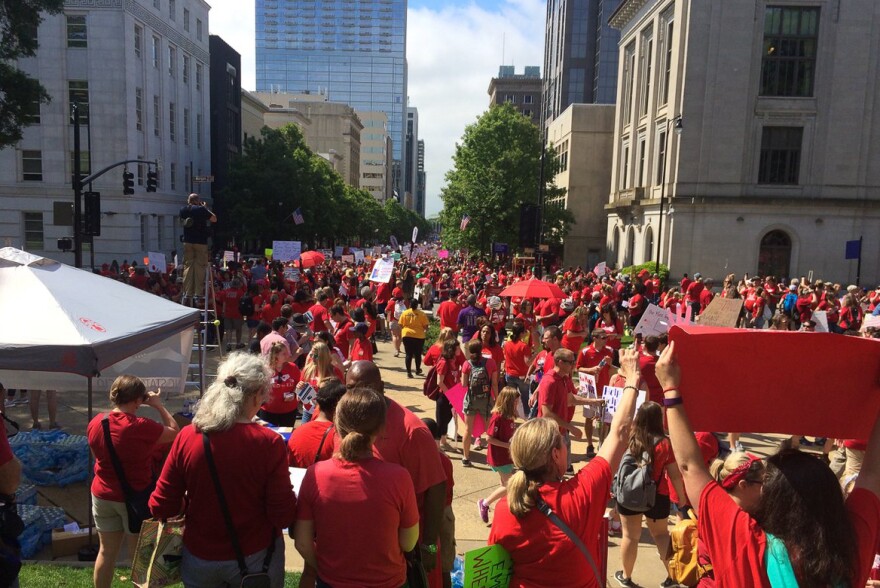Thousands of educators and their supporters from across North Carolina are filling the streets of downtown Raleigh today to demand greater financial investment in public schools from the state legislature. The demonstration comes two days after the House revealed its draft budget for the state, which does not meet most of the marchers' demands.
Demonstrators today held signs with messages for lawmakers, including "They say cut back, we say fight back," and "Don't make me use my teacher voice."
#Red4Ed #Red4EdNC pic.twitter.com/VkRsbjUSBY
— Billy Corriher (@BillyCorriher) May 1, 2019
Marchers want lawmakers to fund more student support staff – like school nurses, counselors and psychologists – to meet national standards; expand Medicaid; raise the minimum wage for all school personnel to $15 an hour; raise teacher and adminstrator salaries by 5%; and restore compensation for teachers with master's degrees. The House's draft budget only meets the last of these demands.
Abraya Johnson traveled two hours from Cabarrus County for the march because she said she sees how hard teachers work every day, and she sees the resources they need.
North Carolina currently ranks 43rd in the country for per-student spending, according to the National Education Association.
Stand up for NC students today! #Red4EdNC pic.twitter.com/P19a9OAiVw
— Marydith Beasley (@MarydithB456) May 1, 2019
"But another thing they're asking is for more school support, such as counselors, psychologists, and school nurses, which are vital to keeping kids healthy and in their seats and able to learn every day," Johnson said.
According to state data, school nurses in North Carolina each serve on average 1,000 students. Some reportedly serve hundreds more than that, or are split between several schools. The Centers for Disease Control recommends one nurse for every 750 students.
"When a parent comes in with a child with a chronic illness and finds out there's a school nurse at that school every day, the difference and the relief that they have," Johnson said. "And also for the teachers! That also makes a difference for them because it allows them to focus on the thing that's most important, which is teaching the children."
This is what democracy looks like...today I march for my students and our future#redforedNC #Red4EdNC #NCEd pic.twitter.com/ldd2scJwNa
— Mr. Smith (@Mr_Smiths_Class) May 1, 2019
School psychologists in the state each serve on average more than 2,000 students. The nationally recommended ratio is one psychologist per 500 to 700 students.
Meeting national standards for the number of school support staff would require an additional investment of more than $650 million from the state, according to a legislative study released last year. It's unclear how much funding the House draft budget would set aside for these positions.
But state lawmakers announced yesterday that under the proposed budget, teachers would get on average a 4.8% raise and principals, a 10% raise.
Some educators take this as a sign that the march today and the teacher's march organized last May, which drew more than 19,000 people in Raleigh, are having an impact.
After reading a couple of social media posts this morning, I decided to change shirts.........#Red4EdNC pic.twitter.com/bE9RIjMRe0
— Dr. William T. Wright, Jr. (@DrWrightSupt) May 1, 2019
"I think it showed the legislature that we're serious," demonstrator Heather Pew said about last year's march.
But Pew, a teacher's assistant from Raleigh, said "it's not just about" the pay raise.
"Everyone wants to say it's about the money," she said. "It's about everything. It's about nurses and not enough counselors and not enough resources, and having to beg parents for pencils and markers, and low-income schools not having the same shot at things as higher-income area schools."









